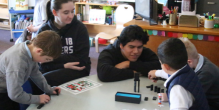What is Values Symposium?
By Greta Cunningham '23, Communications Apprentice
September 7, 2021
Values is a full-year, interdisciplinary class required for all ninth graders. The curriculum combines English, Religion, and Social Studies to explore the seven core CDH values: Catholic, Academic, Leadership, Community, Service, Diversity, and Equity. Each student takes the class with the same group of ninth graders for the entire year.
“It’s important that they spend all this time together because it allows us to talk about our values around topics such as race and gender, as they’ve grown to be really comfortable with each other,” said Thomas Luhman, who has taught Social Studies in Values for 20 years.
Three subjects, three teachers
Values accounts for two periods of a student's schedule but provides students with credits in three different disciplines. Below are some topics and skills addressed under each subject.
|
English |
Religion |
Social Studies |
|
|
|
Students also examine race, gender, and sexuality in each academic area. Often, teachers introduce these topics through literature to use the book’s historical situation, various characters’ perspectives, and authors’ from different backgrounds as an entry way into conversation. All dialogue is grounded in the Catholic teaching of human dignity.
While the curriculum outlines specific objectives for each subject, they are not taught separately.
“We work to teach in a manner where the kids don’t necessarily see the individual disciplines but the connections between them. It caters to a very natural way of learning," said Luhman.
This also allows peak collaboration between teachers.
"There's a kind of creativity that goes on with the three teachers when we talk about how we're going to structure our lessons,” said Jenny Markert, an English teacher who has taught Values. “We all bring something different, which helps strengthen our lessons, and most importantly, the kids get to see us get along and disagree. We are modeling for kids how to be a listener, a speaker, and a participant."
Why ninth grade?
Values was first created in 2000 by former CDH President and Principal Dick Engler in collaboration with teachers from the English, Religion, and Social Studies departments before becoming an official part of CDH’s core curriculum in 2001.
"We wanted to find a way to help incoming students feel like they’re a part of this place more quickly. This course helps students develop a sense of community," said Luhman.
Because there are three teachers, Values classes can have more students while still maintaining CDH's average student-to-teacher ratio of 11:1. The larger class size allows students to meet more of their classmates as they rotate seating around seven different tables, one for each of the CDH values.
"My favorite part of Values has been getting to know my teachers and forming a close bond with them, along with all the friends I've been able to make because of our class size," said Nahimi Beyene '24.
Supporting Every Student
Values introduces students to Multiple Intelligences and Learning Styles (MILS), an educational philosophy CDH uses throughout all four years of high school. MILS identifies nine areas of intelligence — naturalist, logical-mathematical, linguistic, intrapersonal, interpersonal, spiritual, bodily-kinesthetic, spatial, and musical — and encourages teachers to use all nine in the classroom. In Values, students identify their strengths across these categories, along with the study methods that will support them regardless of the subject.
“Especially in group projects, there's a lot of choice to support multiple intelligence learning. Whether you're an artist or a kinesthetic learner, or anything in between, there's something for you. I think that’s part of the reason students enjoy Values so much because it gives them independence in their learning,” said Dr. Janet Watson, a Values Religion teacher.
Students also have the opportunity to work with different teachers within their class's teaching team, as each teacher also has a unique teaching style, and find the fit where there is the most connection.
“Sometimes students feel more comfortable with one teaching style than another as all three of us bring different gifts to the table. They can talk to any of us about an assignment, so they have more options in the adults supporting them,” said Watson.
Unlike other classes, Values is not divided into levels like advanced and honors; all students take the exact same curriculum.
"I think the most important thing we can do to support every student is to listen. When I have a conversation with a student, I try not to be the one talking, to withhold judgment so their opinion can be validated and supported. Really, it all comes down to listening," said Markert.
This listening guides teachers as they work to integrate each student into the classroom.
"We try to teach to the common experience and provide additional support and challenges where needed. We are constantly in conversation with those in the Learning Lab and offer what we call additional learning opportunities on projects for students who want to engage a little bit more," said Watson.
Lessons for a Lifetime
Looking back as a senior, Sarah Diamond '21 found the critical thinking skills she learned in Values to be instrumental in laying a foundation for the rest of her high school experience.
"It wasn't a class where you learned something and memorized it, it was a class where you'd look at the problem and try and solve it. It taught you how to engage in deeper thinking," she said.
As ninth graders approach the end of their time in Values, they can already begin to see the impact it will have after creating a foundation for the rest of their high school academics.
“I think MLA format and essay writing are two of the most important things we learn in Values because they're essential in all subjects and looking ahead to the rest of high school,” said Gideon Teuber '24.
Values is a unifying experience for CDH ninth-graders, who come from over 70 different middle schools.
“I didn't come from one of the main feeder schools, so I didn't know a ton of people when I started, but the teachers helped introduce me to so many people,” said Izzy Macheel '24. “They welcomed everyone and were just so friendly, so now our class is like a family in a way. It helped me make a lot of friends.”
Values gives students the chance to build deeper connections, which fosters friendships that last.
"I think the sense of connection really came from all the discussions we had. Everyone had such different points of view; it was always interesting to hear what they had to say. It helped me get to know who everybody was as a person," said Diamond.
Luhman, Markert, and Watson all had one take away for incoming ninth graders: that Values is a place where you will find belonging.
"Here, you're going to find a group of people that you get along with, that you're going to go through high school with, and that are going to be your friends," said Markert.
Editorial note: This article was written in late spring, 2020-21. Markert is not currently teaching Values but her experience in Values continues to be relevant to this article.
Greta Cunningham '23 is a Communications Apprentice. She is passionate about writing and participates in the CDH Chronicle and the Creative Writing Club. She is also involved in Student Council and competitive figure skating. "I want to have a dynamic role in spreading Cretin-Derham Hall's message and core values, specifically, community and service, during these times," she said.
Subscribe to our e-Newsletters
You might also like:
Empty Bowls Marks 24 Years of Fighting Hunger and Building Community
Cretin-Derham Hall’s 24th annual Empty Bowls event brought together students, local businesses, and community members to raise over $6,000 for Heifer International in support of ending hunger and promoting sustainable living.
CDH Brings Annual Christmas Party Tradition to Community of Saints Children
This year’s festivities included building gingerbread houses, playing games, reading stories, singing songs, visiting Santa, and sharing gifts with the children.
CDH Students Embrace Service and Learning on Trip to San Lucas, Guatemala
On November 24, twelve Cretin-Derham Hall students, along with chaperones Brock Beithon and Ruth Johnson, embarked on a week-long justice education trip to San Lucas, Guatemala.




